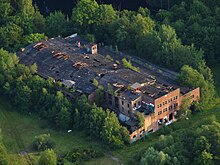Pleistalwerk
The Pleistalwerk , also known as Zeche Plato, is a former brick factory in today's town of Sankt Augustin in North Rhine-Westphalia . The factory site is now in the Birlinghoven district .
history
The Plato colliery was founded by Albert von Mühlmann in 1841 and produced refractory stones, bricks, roof tiles and clay pipes for the drainage of houses and streets. At that time the factory premises belonged to the Niederpleis community .
In 1902 a fire destroyed a furnace house, which was replaced by a three-story brick building. In 1912 the company had 242 employees. Plato AG Bonn, which took over the company in 1912, became insolvent in 1923. In 1924, a major fire destroyed a large part of the factory premises.
On August 1, 1926, Heinrich Startz and his wife acquired the plant and named the company Pleistalwerk Heinrich Startz KG . He built a new furnace house, the so-called chamber furnace, based on his own design . Clinker bricks were produced in the new kiln house .
Initially, the factory obtained the clay from a clay pit on the factory premises, which, however, was exhausted in 1928. Clinker production was then stopped and refractory bricks were produced. In 1930 the company switched entirely to stoneware pipe production. From then on, the clay was delivered from Frechen and Oberpleis via a narrow-gauge siding on the Bröltalbahn , but after the Second World War, increasingly by truck. The plant had had the siding since 1922.
After the Second World War, the need for pipes increased sharply and the Pleistalwerk was well utilized. The quality of the pipes was at the top of West German stoneware production, the pipes of the Pleistalwerk were even exported to Italy, France and Switzerland.
Cessation of production
In 1971 the production was stopped under Gerhard Geerling, because the old factory building could not be modernized inexpensively, the clay deposits in the region were exhausted and pipes made of polyvinyl chloride (PVC) were increasingly being used instead of stoneware pipes .
The factory premises after the end of the Pleistalwerk
After the stoneware pipe production ended, the machines were dismantled, renovated and sold. Parts of the site were used by a company for the production of automation machines for the plastics and automotive industries until the 1990s. Since then, the site has not been used and the building has fallen into disrepair. The entire factory site was sold in 1991 by the Geerling GbR family to the GbR Rehaklinik Sankt Augustin; However, this went into bankruptcy. At the end of the 1990s the site was used as a storage area for various companies.
Entering the site has been prohibited since 2008, as there is an acute risk of collapse, and the remains of production facilities and water basins in the directly adjacent forest behind the building can also pose a risk.
swell
- Alois Richarz and Heinrich Geerling: The history of the Pleistalwerk Heinrich Startz KG, the former Plato colliery and later Platowerke In: Contributions to City History , Volume 47, 2008, published by the Sankt Augustin City Archives, ISSN 0936-3483 , ISBN 978-3-938535- 45-5
Individual evidence
- ↑ City map of the Department of Urban Planning and Building Regulations of the City of Sankt Augustin. Edition 2005
Coordinates: 50 ° 45 ′ 16.4 ″ N , 7 ° 12 ′ 51.1 ″ E


